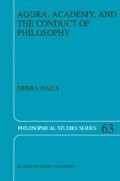Abstract
Philosophy at its most dynamic and most productive is characterized by double open-endedness. Not only is the philosopher eager to go where the finest arguments lead, without prejudging the outcome of any philosophical search, but the best philosophers also refuse to allow the doors of inquiry to swing shut behind them, never permit the suppositions and postulates with which an investigation begins to be insulated from further scrutiny down the line. Socrates has long been recognized as the champion of the first sort of open-endedness, paradigmatically engaging in philosophical conversations that lead ultimately, however interesting their course, toaporiauncertainty1) Plato’s greatest achievement, his breakthrough from pre-Socratic, sophistic, and rhetorical precedent, was the thoroughgoing application of a doubly open-ended philosophical method, leading Plato to criticize most effectively even the beliefs he may have cherished most deeply. Plato’s dialogues are and were in Plato’s lifetime occasions to philosophize further, not dogmatic treatises. Whether this was a method Plato shared with Socrates, or one he developed independently, the Platonic dialectic as I have just characterized it expresses what is still best in the conduct of philosophy—whether civic or academic.
FootNote
1 To anticipate what I qill later argue, if Plato was to some extent an apologist for Soctates, then it was in his apologetic interest to downplay any interest Socrates may have had in natural philosophy and to emphasize the man’s interest in practial ethical matters instead, so we ought not to discredit completely Socreats’s interest in natural philosophy as Arstophanes depicts it.
Access this chapter
Tax calculation will be finalised at checkout
Purchases are for personal use only
Preview
Unable to display preview. Download preview PDF.
Author information
Authors and Affiliations
Rights and permissions
Copyright information
© 1995 Springer Science+Business Media Dordrecht
About this chapter
Cite this chapter
Nails, D. (1995). Introduction. In: Agora, Academy, and the Conduct of Philosophy. Philosophical Studies Series, vol 63. Springer, Dordrecht. https://doi.org/10.1007/978-94-011-0151-6_1
Download citation
DOI: https://doi.org/10.1007/978-94-011-0151-6_1
Publisher Name: Springer, Dordrecht
Print ISBN: 978-94-010-4068-6
Online ISBN: 978-94-011-0151-6
eBook Packages: Springer Book Archive

